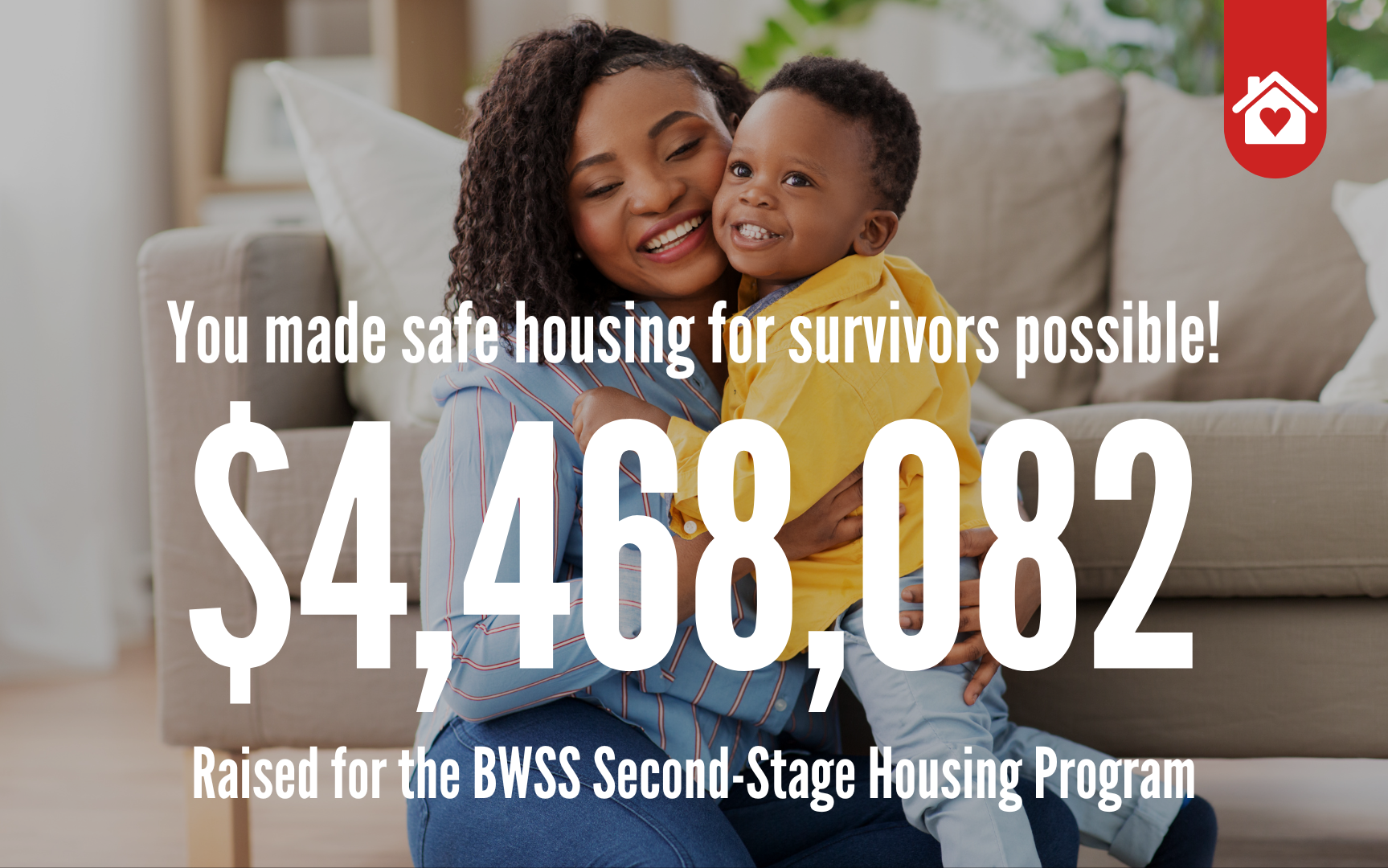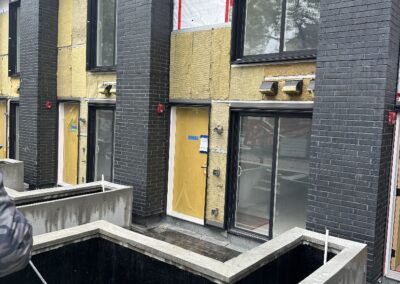May 27, 2024 | Battered Women's Support Services
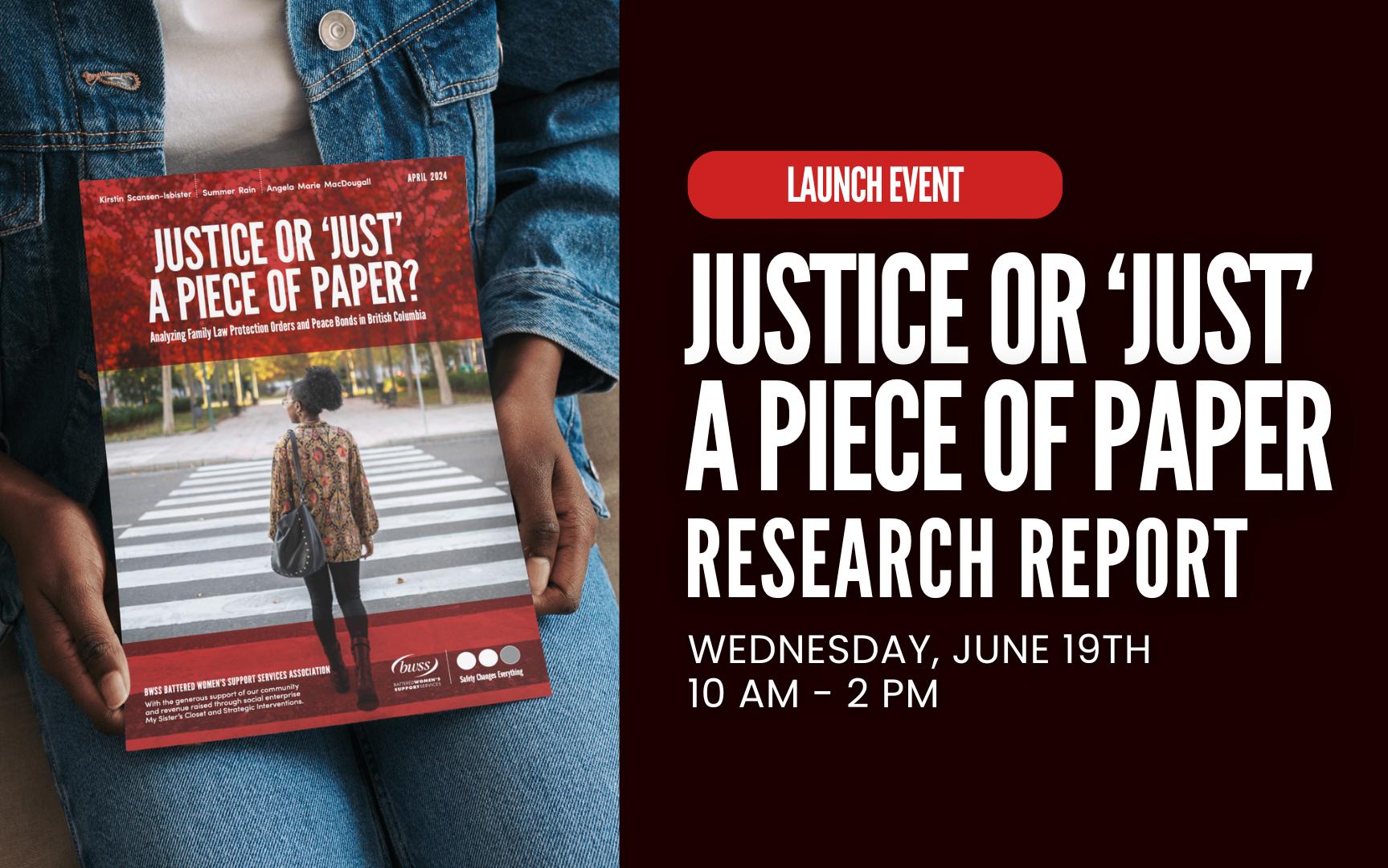
Let’s talk about protection orders in British Columbia.
Over 24 women in BC were victims of femicide in 2022 alone. This is almost double from an average of 12 women per year between 2010 and 2015.
In response, Battered Women’s Support Services (BWSS) conducted two surveys to better understand the challenges and barriers that survivors’ and front-line workers’ experience with obtaining and seeking enforcement of family law protection orders and peace bonds in British Columbia.
“We know from our experience on the frontlines that women face numerous challenges and barriers to obtaining family law protection orders and peace bonds.” Says Summer-Rain Legal Advocate and Indigenous Justice Lead, Justice Centre at BWSS, “These surveys come at a critical time of rising rates of intimate partner violence, sexual violence, and femicide in BC.”
A year later, Battered Women’s Support Services (BWSS) announces the launch of latest research, “Justice or ‘Just’ a Piece of Paper.”
The results from this study will inform broader law reform and systemic change including legal, policy and police reform, public education and awareness campaigns, and training programs for survivors and the anti-violence workers who support them.
The report, “Justice or ‘Just’ a Piece of Paper” covers topics including, but not limited to: intimate partner violence; domestic violence; sexualized violence; and other forms of gender-based violence. It also covers family law Protection Orders, Peace Bonds, police responses and the legal system as it relates to violence against women and gender-based violence.
BWSS invites you to join us at our launch event on Wednesday, June 19th from 10 AM to 2 PM. The event offers hybrid attendance options, allowing participants to join either in person or virtually.
Learn more about the initial surveys.
The event offers hybrid attendance options, allowing participants to join either in person or virtually.
- Location of Virtual: Zoom
- Location of In Person: 301-1522 Commercial Drive, Vancouver, BC
- Capacity for the In Person Event has been reached. You are still welcome to join virtually!
Sorry. This form is no longer available.
May 27, 2024 | Battered Women's Support Services
Thank you for making this possible!
We are thrilled to extend our deepest gratitude to you and our incredible community for rallying behind creating safe housing for women survivors of intimate partner violence. When we started this journey, there were many who thought it couldn’t be done – raising four million dollars in a year.
Thank you so much to all the amazing donors – 67 strong – who were inspired to demonstrate an unwavering support of survivors in our community! Your support propelled us far beyond to exceed our goal to raise $4,468,082.97 for the Second-Stage Housing Program at BWSS.
Since 1994, we have sustained a vision to expand the work at BWSS to provide safe housing for women survivors of intimate partner, domestic, and sexualized violence. Today, because of you, this vision is a reality. This Fall 2024, we will welcome 10 families into brand-new condos and townhouses. So join us to celebrate this moment!
Because of you, women and their children fleeing violence can receive transitional housing operated by BWSS to rebuild their lives while accessing the wrap-around support service and advocacy that is already available at our Vancouver office.
Your contributions will directly impact women and children, providing a safe space for women and their children to rest, recover, and rebuild lives ravaged by domestic violence.
What’s Next?
As we celebrate the accomplishment of purchasing housing for a Second-Stage Housing program, this excitement is only the beginning. Please stay tuned to join us as we embark on the next phase of this journey as we look ahead by turning this housing into a home.
Together, we are disrupting the individual and systemic barriers to bring more safe options for women and their children living with domestic violence. We have said it before and will say it again… a safe home changes everything.
May 25, 2024 | Battered Women's Support Services
There are many myths attached to domestic and intimate partner violence.
An abusive partner’s emotional problems do not cause their abusiveness. Importantly, he cannot be changed by figuring out what is bothering him, helping him feel better, or improving the relationship dynamics.
It’s believed that it’s feelings that drive abusive or controlling behaviour; when actually it’s beliefs, values and habits are the driving forces.
To be plain, the reasons that an abusive man gives for his behaviour are simply excuses.
There is no way to overcome a problem with abusiveness by focusing on aspects such as self-esteem, conflict resolution, anger management or impulse control.
Abusiveness is resolved by dealing with abusiveness.
Abusive partners thrive on creating confusion, including confusion about the abuse itself.
Abuse and respect are opposites. Abusive partners cannot change unless they deal with their core disrespect of their partners.
Abusive partners are far more conscious of what they are doing than they appear to be. However, even their less-conscious behaviours are driven by their core attitudes.
Self-care is a better way to deal with an abusive partner rather than trying to get them to change.
16 Myths about Abusive Partners
- He’s mentally ill
- He misuses alcohol and or other substances
- He was abused as a child
- He has poor communication skills
- He just loses it; he can’t help himself
- He has trust and or intimacy issues and afraid of abandonment
- He has anger issues
- His previous partner hurt him, he’s still wounded by her
- He doesn’t know how to express his feelings
- He’s an alpha male, a macho, so he’s aggressive by nature
- You always hurt the one you love the most
- He has a horrible boss who is trying to keep him down
- He doesn’t know the rules in Canada
- He’s being emasculated in the world or he’s a victim racism, and/or poverty, and/or his immigration status or other discrimination
- Women are as abusive as any abusive man
- He has low self esteem
For more information on our website or ☎️ our crisis & intake line 1-855-687-1868
Thank you 💕 to all the victims and survivors who have shared their experiences and wisdom ☀️ with us at BWSS over the past 45 years.
Props to Lundy Bancroft whose work inspired this post.

May 9, 2024 | Battered Women's Support Services
Honouring Mothers: The Reality of Violence in Motherhood

As Mother’s Day approaches, it’s a time for celebration and reflection, a moment to honour the incredible sacrifices and love that mothers around the world offer to their families and our communities.
Yet, amidst the flowers, brunches, and heartfelt cards lies a sobering truth: many mothers endure unspeakable hardships, including intimate partner violence by their husbands or partners, rendering the home unsafe for children as well.
1 in 3 women experienced intimate partner violence between the birth of their first child and their child turning 10 years of age.The statistics are stark and undeniable.
Every year, 1 in 3 women face emotional, physical, and sexualized violence, a reality that often escalates even during pregnancy, a time when one should expect safety and care.
Shockingly, pregnancy is a risk factor for lethal violence and as many as one in four women experience violence during this vulnerable period, increasing the risk of miscarriage, stillbirth, and abusive relationships forms the basis for why many pregnant women seek abortion.
But the impact doesn’t stop there, Friend. Violence against women reverberates through generations, affecting not only the mothers but also their children who witness these horrific acts.
5 children in every Canadian school classroom have witnessed their mother’s abuse by a father or father figure, with 80% of children who witness going on to victimize or become victims in adulthood.
Therefore, at BWSS, we stay on the frontline and confront violence against women head-on, responding to over 25,000 requests for service in 2023, with 65-68% of women who access BWSS being mothers aged 18 years and older.
Remember, violence against women diminishes us all, eroding the fabric of our communities and undermining the very essence of humanity for too long.
But together, we are disrupting this cycle by supporting thousands of mothers to live free of intimate partner, domestic, and sexualized violence.
In honour of Mother’s Day, for every $1 you donate, BWSS programs for mothers will get $2!
An anonymous donor will match gifts to our Mother’s Day Matching to Midnight, up to $2,500 from now until midnight on Monday, May 13, 2024.
Give a gift of $100 or more, and you’ll receive a gift of $25 to shop online or in-store at My Sister’s Closet.
Mother’s Day Matching till Midnight, Give a Gift, Get a Gift!
Apr 24, 2024 | Battered Women's Support Services, Safety Resource Series
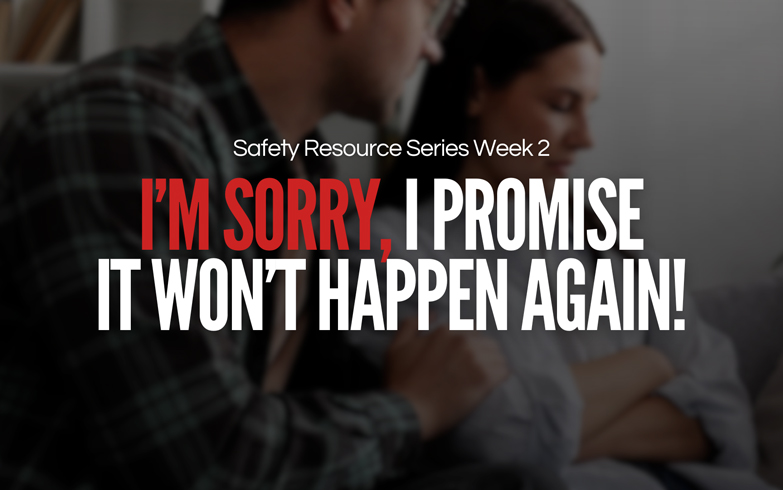
Perhaps your partner yelled insults at you, or maybe they pushed you when they were drunk or high and later apologized. What if they promise it will never happen again?
Or maybe you found out that your partner used to harass their ex-girlfriend at work. However, they say it was because she was “crazy,” made “everything” up, and since you’re “different,” there’s nothing to worry about.
How can you be sure that the abusive behavior won’t happen again?
These are questions that many victims of abuse wrestle with, caught in the tangled web of love, hope, and fear. It’s not uncommon for abusers to offer apologies, promises, and excuses in the aftermath of their actions. They may beg for forgiveness, swear to change, and plead for one more chance.
The truth is abuse does not tend to be an isolated incident, and it’s uncommon for someone with a history of abuse towards you or previous relationships to never repeat it. Often, these are warning signs of escalating abuse, which may start with coercion, intimidation, and emotional abuse before ultimately leading to physical abuse.
If your partner has a history of abusive behavior, whether physical, verbal, emotional, or psychological, it’s important to approach their apologies with caution.
So, does this mean they can’t change?
Change is possible; however, it’s not a quick fix and will require a lot of work and professional support. Regardless, it’s not your responsibility to stay while the abuser works on their behaviour and takes responsibility for their actions. Remember, you did not cause this behaviour, and it’s important to prioritize yourself.
However, if you are unsure whether or not they have changed, here are some indicators to consider:
E
Couples counseling does not count, as this is an issue with the individual and not the relationship. In fact, if your partner insists on couples counseling to address their abusive behavior, it may be a red flag, as they are not taking sole responsibility for their actions but rather sharing the burden.
E
It’s recommended that abusers seeking to change their behaviour attend rehabilitation programs such as batterer intervention programs.
E
Have they fully acknowledged and taken responsibility for their actions toward you or their other victims? Do they badmouth their previous victims and shift blame onto others or try to justify their actions by saying things like “My ex was always starting drama” or “they made me act like that”?
E
Pay attention to how they react when you offer advice or point out a mistake. If they become angry or blow up at you, making you feel scared to voice your grievances, then it’s safe to say they are still exhibiting abusive behaviors.
Keep in mind, abusers might alter their abusive patterns, and time alone isn’t sufficient to ascertain whether they have genuinely transformed.
My partner hasn’t physically abused me, but their behaviour towards me can be very toxic.
Often, abusers tend to escalate from toxic behaviours to abusive behaviours, which can also include coercive control, verbal, emotional, or sexual abuse. Sometimes, early in the relationship, these may be hard to identify regardless of the severity of abuse.
Here are some red flags that indicate the abuse continues and is likely escalating:
^
If your partner downplays the severity of their actions or shifts blame onto external factors or you, it may indicate a lack of genuine accountability.
^
If your partner apologizes followed by a recurrence of abusive behavior, it suggests a pattern of manipulation and control rather than sincere remorse.
^
If they are dismissing your concerns, denying the reality of past abuse, or attempting to rewrite history are all forms of gaslighting, which can further erode your sense of self and undermine your trust in your own perceptions.
^
If they speak words without meaningful actions to address the root causes of the abusive behavior, such as seeking therapy, attending anger management classes, or joining a support group, it’s unlikely to lead to lasting change.
^
If they are trying to control different aspects of your life like how you dress, who you can socialize with, or controlling your money.
^
If they threaten to physically harm you or your children.
^
If they push your boundaries or force you during sexual activities to do things you are not comfortable with.
^
If they blame their outburst, anger, or violence on external environments such as drinking too much, work stress, or having a bad day.
^
If they try to isolate, you from your family and friends by damaging those relationships to be the sole influence in your life.
- He’s mentally ill
- He misuses alcohol and or other substances
- He was abused as a child
- He has poor communication skills
- He just loses it; he can’t help himself
- He has trust and or intimacy issues and afraid of abandonment
- He has anger issues
- His previous partner hurt him, he’s still wounded by her
- He doesn’t know how to express his feelings
- He’s an alpha male, a macho, so he’s aggressive by nature
- You always hurt the one you love the most
- He has a horrible boss who is trying to keep him down
- He doesn’t know the rules in Canada
- He’s being emasculated in the world or he’s a victim racism, and/or poverty, and/or his immigration status or other discrimination
- Women are as abusive as any abusive man
- He has low self esteem
Okay, I think I need help!
It’s crucial to prioritize your safety and well-being above all else. Remember, it’s not your fault, and you do not deserve to be mistreated.
Here are some pointers for leaving and healing from an abusive relationship:
Z
Prioritize your health by scheduling an appointment with a medical professional to assess your physical health. Abuse can have physical impacts on your overall well-being, as well as your mental health.
Z
Come to terms with what cannot be changed. It’s not your responsibility to help your abusive partner “fix” or “change” their behaviour, and remember, being abusive is a choice, not a mental illness.
Z
Reach out to your support system and inform them of what’s been happening. Build a safe network for yourself, as this journey will be difficult.
Z
Limit or cut off communication with your abuser. This will help maintain healthy boundaries and reduce the likelihood of being guilted or manipulated into returning to the relationship
Z
Most importantly, seek professional help for safety planning, counseling, and other supports to help you reach safety.
You are not alone.
If you or someone you love is in need of support, please contact the Battered Women Support Services at Crisis Line:
Call toll-free: 1-855-687-1868
Metro Vancouver: 604-687-1867
Apr 22, 2024 | Battered Women's Support Services, Safety Resource Series
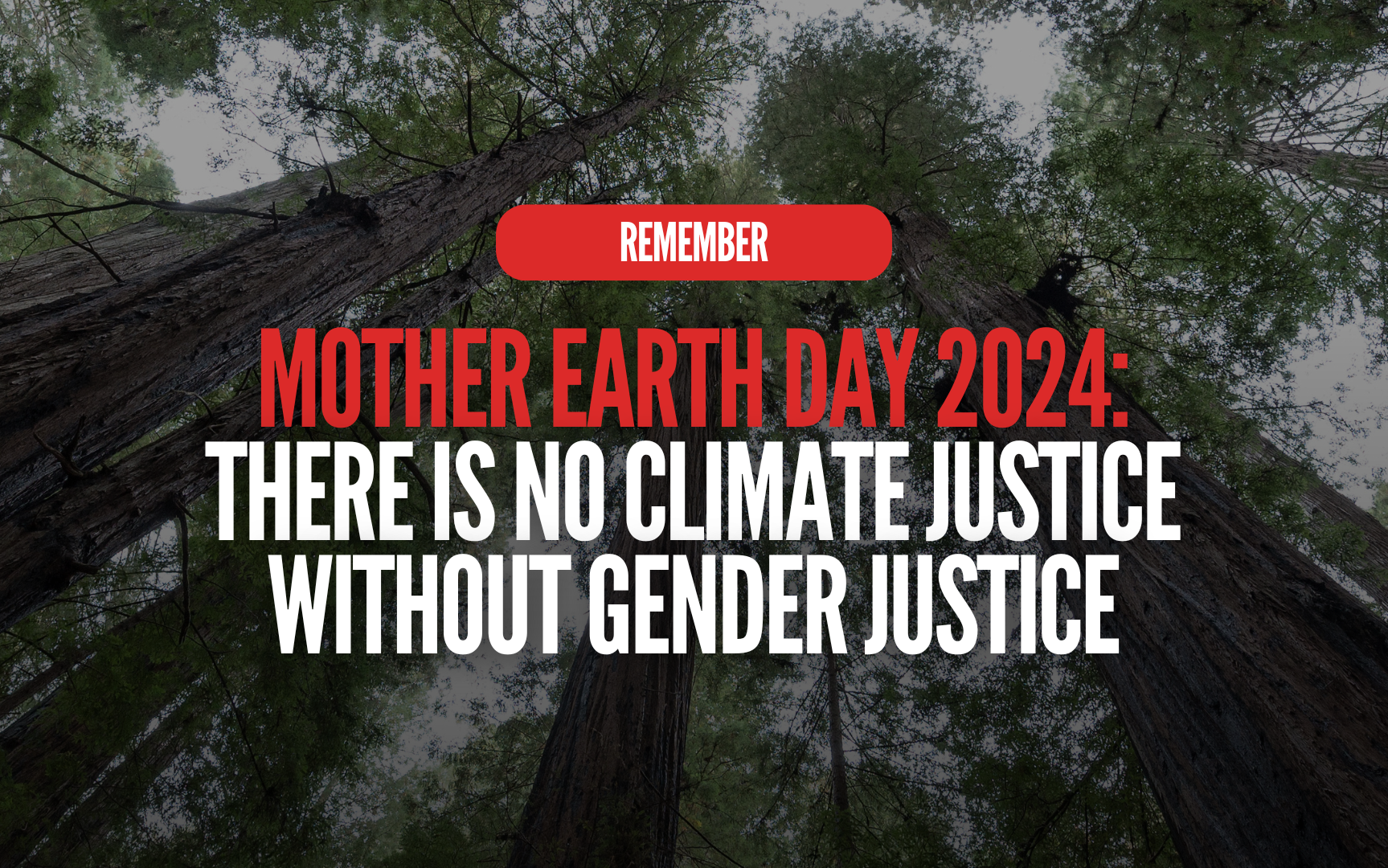
Women, who make up the majority of the world’s poor, are largely more dependent on natural resources, placing them at the front lines of climate change, with less economic resources to combat its impact.
There is a causal interrelationship between gender inequalities and environmental degradation; where the loss of biodiversity, ecosystems and climate change tend to exacerbate existing gender inequalities.
Women and in particular Indigenous women are essential agents of change in their communities to increase the resilience of their environments, as well as to mitigate and confront environmental degradation and climate change. In relation to conservation and climate actions, women generally and Indigenous women specifically have different knowledge of the social and environmental setting and differentially support environmental initiatives associated with various sectors where they uniquely contribute to the protection and sustainable management of terrestrial and marine ecosystems, which promotes the sustainability and effectiveness of nature-based solutions to the biodiversity and climate crisis facing the world.
We are excited to take part in Fashion Revolution Week 2024 as part of our ongoing, urgent work at the intersection of thrift fashion and ending gender-based violence.
Countries in the global South bear the heaviest social, gendered, and environmental burden of the fashion industry.
Women workers are toiling in sweatshops, where they work 14 to 16 hours per day, seven days a week, and endure labour abuse and sexual harassment. The fast fashion industry is also the third most polluting industry on earth.
If you share our vision for systemic change in the global fashion industry and want to get involves, or to learn more about the exploitation that is entrenched within the mainstream fashion industry, please see last week’s Ending Violence Blog “Fashion Justice.” at bwss.org.


